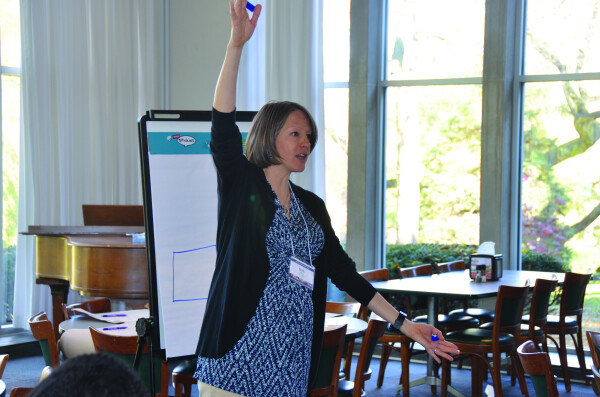Innovation Hub offers new avenues for ministry
By Erik Alsgaard
In and around Washington, D.C., young adult ministry has proved challenging to create and maintain. But young adults comprise about 20 percent of the population (ages 20-29) in the District, which had an estimated 693,972 residents in 2017 per the U.S. Census Bureau.
As churches search for ways to minister to, for and with young adults, help has come in the form of an “Innovation Hub,” based at Wesley Theological Seminary in Washington. Several Baltimore-Washington Conference churches are participating in this program, thinking outside the box and making new disciples of Jesus Christ in this hard to reach generation.
 The biggest challenge may just be casting aside assumptions about young adults and developing deeper empathy for them, said the Rev. Beth Ludlum, vice president for Strategic Initiatives at Wesley and a co-director for the Hub.
The biggest challenge may just be casting aside assumptions about young adults and developing deeper empathy for them, said the Rev. Beth Ludlum, vice president for Strategic Initiatives at Wesley and a co-director for the Hub.
The Hub provides training, including seminary classes, seminars and retreats, said Ludlum. Each church brings a team of lay and clergy leaders to head up their projects. After six months of learning, teams create proposals for their method of engagement and apply for a $20,000 grant.
Funding for the Hub has come from a $1.5 million grant from the Lily Endowment. Fifteen churches from in and around Washington were selected for the second round of the Innovation Hub. After finding out where young adults were already engaged — or not — in their local churches, last September, church leaders began their work by interviewing young adults in their community. In November, the churches gathered again to share what they had learned and to map out next steps for ministry.
One of the benefits of the Hub process, Ludlum said, is that young adults are involved in the program from the very start. As a result, several young adults have felt empowered by the process, “found their voice,” she said, and stepped up to other leadership roles in their churches.
The other thing they’ve seen is a deeper understanding of innovation and design thinking, especially as a process that a church can embrace, she said. “The process starts with deep empathy of the people you’re trying to reach,” Ludlum said. “Really getting to know them and their stories, and then going through a creative process around that. What we’re finding is that it makes sense to congregations once they practice it, and it offers an alternative to what is otherwise a frustrating cycle of ‘We’re going to do it the way we’ve always done it,’ or ‘We’re going to chase one great idea until it fizzles.’”
Lark Lewis, a young adult from Capitol Hill UMC in Washington, said that her church was involved with the Hub because they have noticed a need in their community.
“The area is changing quickly,” Lewis said, adding that she had noticed the difference after moving to the area two years ago. “We are trying to actively define how we reach out to those young adults in our area.”
The church’s pastor, the Rev. Alisa Lasater Wailoo, said that the church has been effective in reaching young adults who have grown up in the church. However, “we aren’t effective in reaching young adults without a church background. That’s why we’re in the Hub.”
The Rev. David Deans, associate pastor at Oakdale UMC in Olney, was at the meeting along with Ricky Atkins, a co-leader of the church’s young adult ministry. Oakdale Church is involved with the Hub because it was an opportunity to be creative and innovative in reaching young adults for Jesus, Deans said.
“We have a thriving young adult ministry already,” Deans said, “but we’re always looking to expand that and learn more. By being a part of this cohort, it forces our team to focus on this area of ministry more intentionally. I’m hoping that this will bear some fruit with creative ministry.”
